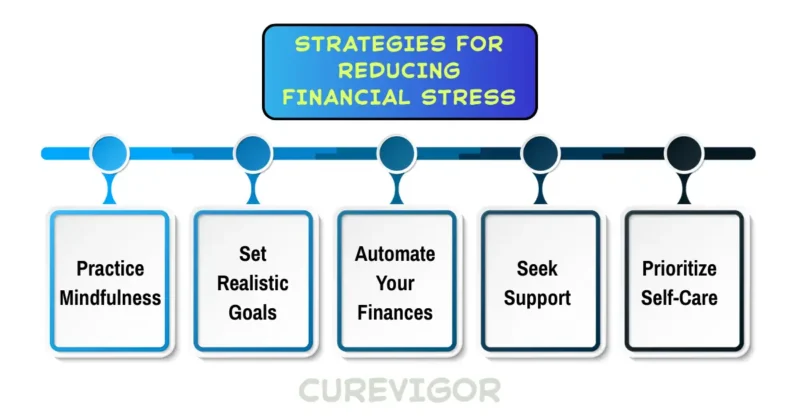Uncover practical strategies to achieve financial success without stress. Learn how to build wealth, maintain economic stability, and enjoy financial freedom while protecting your mental well-being.
Thank you for reading this post, don't forget to subscribe!How to Achieve Financial Success Without Stress
Have you ever noticed how the topic of money often comes with a heavy sigh? For many people, the pursuit of financial success feels like a never-ending race—working longer hours, juggling multiple bills, and constantly worrying about the future.
We’re told that to achieve economic stability, we must hustle harder, save more, and sacrifice today for tomorrow. However, the truth is that this mindset often leaves us feeling burned out, anxious, and disconnected from what truly matters.
Here’s the good news: financial success doesn’t have to come at the expense of stress. In fact, the two don’t belong together at all. Achieving financial success is less about chasing wealth and more about creating balance.

It’s about aligning your money with your values, building habits that support long-term stability, and protecting your mental and emotional well-being along the way.
Imagine a life where you’re not constantly checking your bank account in fear, but instead making confident, informed decisions with a sense of peace. A life where money is a tool, not a source of anxiety. That’s what this guide is all about—helping you achieve financial success while keeping stress at bay.
Understanding Financial Success
Financial success goes far beyond the size of your bank account. It’s about stability, security, and the ability to live life on your terms. True success is having the financial resources to pursue your passions, take care of your loved ones, and enjoy peace of mind knowing you’re prepared for life’s uncertainties.
For some, financial success means being debt-free and living comfortably within their means. For others, it’s about creating wealth through investments or building multiple streams of income. No matter how you define it, the essence remains the same—achieving financial stability without sacrificing your happiness or health.
Key Principles for Achieving Financial Success
Live Below Your Means
One of the golden rules of financial success is spending less than you earn. This simple yet powerful principle allows you to save consistently and invest for the future. Instead of chasing a lifestyle that keeps you in debt, focus on mindful spending that supports long-term goals.
Create a Budget
Budgeting is like having a roadmap for your money. When you track your income and expenses, you gain a clear picture of where your money is going. This awareness helps you make smarter financial choices, cut unnecessary costs, and direct more funds toward savings and investments.
Invest Wisely
Investing is key to building wealth, but it should align with your goals and comfort level. From stocks and bonds to real estate and retirement accounts, selecting the right assets can foster long-term growth while mitigating risks. The earlier you start, the more your money benefits from compounding growth.
Build Multiple Income Streams
Relying on one paycheck can be risky. Side hustles, freelance work, rental properties, or passive income streams provide financial security and reduce stress. Diversifying income also gives you more flexibility and control over your future.
Minimize Debt
Debt can significantly impact both your financial situation and mental well-being. Prioritize paying off high-interest debts, such as credit cards, and avoid unnecessary borrowing. A debt-free life not only enhances your financial well-being but also alleviates daily stress.
Strategies for Reducing Financial Stress

Practice Mindfulness
Money stress often builds because we replay old mistakes or spiral into fears about what could go wrong tomorrow. Mindfulness helps break that cycle by anchoring you in the present moment.
Something as simple as pausing to take a few deep breaths before making a financial decision can reduce anxiety and prevent impulsive choices. Mindful practices such as meditation, journaling about your money habits, or even walking without distractions allow you to quiet mental noise.
Over time, mindfulness reshapes how you relate to money—it becomes less about fear or regret and more about clarity, intention, and control.
Set Realistic Goals
Ambitious financial goals are inspiring, but they can also backfire if they feel too overwhelming. Setting realistic, achievable goals prevents burnout and builds steady momentum. Instead of declaring, “I’ll be debt-free in six months,” a healthier approach might be, “I’ll pay an extra $100 toward my credit card each month.”
Each small milestone becomes a confidence boost, helping to keep your financial journey sustainable and on track. Another effective method is SMART goal setting—specific, measurable, attainable, relevant, and time-bound targets. This ensures you always know what you’re working toward and when you’ve achieved it.
Automate Your Finances
One of the easiest ways to reduce financial stress is to let technology do the heavy lifting. Automation turns good money habits into background processes that require little mental energy.
For example, direct deposits can send a portion of your paycheck straight into savings before you even see it. Automatic bill pay eliminates late fees and the stress of juggling due dates.
Even investing platforms now allow for recurring contributions, so your wealth grows without requiring you to check in constantly. The less you manually manage, the fewer chances there are for mistakes—and the more consistent your progress becomes.
Seek Support
Many people carry financial stress silently, believing they must “figure it out alone.” But money is one of the most common challenges people face, and seeking guidance can make all the difference.
A certified financial planner can help you design a strategy tailored to your situation. If professional help feels out of reach, consider free financial counseling services, local workshops, or community programs.
Even discussing your concerns with a trusted friend or family member can ease the emotional weight and bring fresh perspectives. Remember, asking for help is not a sign of weakness—it’s a decisive step toward financial empowerment.
Prioritize Self-Care
Your financial health and physical health are deeply intertwined. Stress from money troubles can lead to poor sleep, unhealthy eating, and even chronic illness. Likewise, when you’re exhausted or burned out, making financial decisions becomes more challenging.
Prioritizing self-care—whether that’s going for a morning run, preparing balanced meals, practicing yoga, or simply taking a tech-free evening—strengthens your ability to face challenges with a clear, calm mindset.
Even small routines, such as setting aside 10 minutes each night to unwind, can help restore balance. By caring for your body and mind, you’ll find that managing money feels less like a battle and more like a thoughtful process.
Mindset Shifts for Financial Success
Practice Mindfulness
Money is one of the top stress triggers, often stemming from obsessing over things outside our control—such as regretting a bad purchase from years ago or worrying about what the economy might look like in five years.
Mindfulness is a tool that shifts your perspective and brings you back to the present moment. By training yourself to notice your thoughts without judgment, you can make more informed, calmer, and intentional financial decisions.
For example, before clicking “buy” on an impulse online purchase, pause and take three deep breaths. Ask yourself: Does this align with my financial goals, or is it just an emotional response? Over time, these mindful pauses reduce financial regrets.
Some people also practice mindful budgeting, where they review their expenses slowly and with curiosity, rather than criticism. This not only decreases anxiety but also helps you uncover patterns and habits that you may not have been aware of before.
Set Realistic Goals
Ambitious financial goals sound great on paper, but if they’re too big or vague, they often lead to frustration and burnout. Realistic goals break down the big picture into smaller, actionable steps that are achievable and motivating.
Take the example of saving for a down payment on a home. Instead of focusing solely on the daunting total—say $40,000—set smaller checkpoints, such as saving $500 a month or building an emergency fund of $2,000 first. Each milestone you hit provides a sense of accomplishment and keeps you motivated.
Another helpful strategy is to tie your goals to meaningful life values. Saving isn’t just about numbers—it might mean securing a safer neighborhood for your kids or giving yourself the freedom to travel. When goals have personal meaning, they become easier to commit to consistently.
Automate Your Finances
Financial stress often comes from juggling too many moving parts at once: remembering bill due dates, transferring money into savings, and setting aside cash for investments. Automating these processes eliminates mental clutter and ensures consistency.
For example, you can schedule automatic transfers to your savings account the day your paycheck arrives. That way, you’re “paying yourself first” without having to think about it. Similarly, setting up autopay for utilities and credit cards prevents missed payments and late fees.
Even retirement contributions can be automated, allowing your money to grow quietly in the background. This not only saves time but also removes the temptation to spend money impulsively—because the money is already where it needs to be before you even have access to it.
Automation brings financial peace of mind, enabling you to focus on living your life instead of constantly managing your accounts.
Seek Support
There’s a stigma surrounding the discussion of money, which can make financial stress feel incredibly isolating. Many people carry the burden quietly, believing they should “figure it out themselves.” However, reaching out for help—whether it’s professional or personal—can significantly lighten the load.
A financial advisor or planner can provide customized strategies for debt management, investing, or retirement planning. If you’re not ready for a professional, there are also nonprofit organizations, credit counseling services, and even online communities where people share their experiences and tips.
Sometimes, even a simple conversation with a partner or trusted friend can help reduce anxiety and create accountability.
Support also comes in the form of education. Reading personal finance books, listening to podcasts, or attending workshops can equip you with the tools to make better decisions and feel less isolated in your struggles. The key is to remember: asking for guidance is not a weakness—it’s a proactive step toward financial freedom.
Prioritize Self-Care
Financial stress doesn’t just affect your wallet—it seeps into your physical and emotional health. Chronic stress can trigger insomnia, weaken your immune system, and even contribute to conditions like high blood pressure. That’s why taking care of your body and mind is essential for financial well-being.
Self-care doesn’t have to mean expensive spa days or luxury vacations. It can be as simple as daily walks, unplugging from social media for an hour, cooking a healthy meal, or journaling about your financial goals.
These practices lower stress hormones, boost mental clarity, and enhance resilience, making it easier to manage economic challenges without feeling overwhelmed.
In fact, research indicates that well-rested individuals tend to make more informed financial decisions. When you’re tired or anxious, you’re more likely to overspend, procrastinate on bills, or avoid looking at your accounts. Prioritizing sleep, nutrition, and stress-relief activities gives you the clarity to approach your finances rationally rather than reactively.
Long-Term Benefits of Financial Success
When you achieve financial success without unnecessary stress, the benefits ripple far beyond your bank account. It transforms not just your lifestyle, but also your mindset, relationships, and the opportunities you can create for others.
Increased Freedom
One of the most empowering outcomes of financial success is the freedom it affords. It gives you the ability to design your life rather than feel confined by financial obligations.
For some, this might mean the flexibility to leave a job that no longer aligns with their values, take a sabbatical to recharge, or explore entrepreneurial passions without the constant fear of failure.
Financial freedom also brings the option to say “yes” to experiences instead of constantly worrying about the cost. Imagine being able to travel spontaneously, spend more quality time with loved ones, or pursue creative hobbies like writing, painting, or gardening. These choices bring a sense of control and fulfillment that money alone cannot buy.
Improved Quality of Life
Money worries are a silent source of stress for millions of people, often leading to strained relationships, anxiety, and even health problems. Achieving financial stability lifts that invisible weight. Suddenly, day-to-day life feels less about survival and more about thriving.
With financial success, you can afford healthier food, better healthcare, and safer living environments—all of which directly impact your well-being. Beyond physical health, the mental relief of not living paycheck to paycheck fosters stronger, more stable relationships.
Couples fight less about money, parents feel more confident providing for their children, and individuals feel a greater sense of security.
It’s not about luxury—it’s about peace of mind, stability, and the ability to make choices without fear.
Legacy Building
One of the most meaningful outcomes of financial success is the ability to create a legacy. A strong economic foundation allows you to pass on more than just wealth—you can pass on values, opportunities, and stability to future generations.
For parents, this may mean funding a child’s education without loans, providing a down payment for their first home, or instilling healthy money habits that will serve them for life.
For others, legacy might take the form of philanthropy—donating to charities, supporting causes you care about, or even establishing a foundation in your name.
Generational wealth doesn’t just mean money—it’s about creating stepping stones for those who come after you, so they can build their dreams on a firmer foundation than you had. This sense of contribution adds meaning and purpose to financial success, making it about more than just personal gain.
Conclusion
At the end of the day, financial success isn’t just about having more—it’s about feeling secure, free, and in control of your life. Yes, numbers matter. Saving, budgeting, and investing are powerful tools for achieving financial goals. But true success also requires balance: protecting your peace, taking care of your health, and keeping your goals realistic and meaningful.
When you learn to reduce financial stress through mindfulness, thoughtful planning, and mindset shifts, money stops being a constant source of worry. Instead, it becomes a tool that supports your dreams—whether that’s buying a home, traveling the world, retiring early, or simply living without fear of the next bill.
And perhaps the most significant part? Financial success has a ripple effect. It improves your quality of life, strengthens your relationships, and even allows you to leave a lasting impact on your family or community. You’re not just building wealth—you’re building a foundation for joy, stability, and legacy.
So take a deep breath. Remember that financial success isn’t a sprint, and it doesn’t need to come with stress. Step by step, with the right mindset and strategies, you can build a financial future that gives you both stability and peace of mind.
Get more Health & Fashion Tips.
You might like to read:

